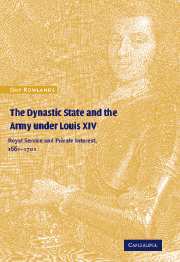Book contents
- Frontmatter
- Contents
- List of maps
- Acknowledgements
- List of abbreviations
- Family tree of the Le Tellier: 1. Principal branch
- Family tree of the Le Tellier: 2. Royal household marital connections
- Map 1 The French provinces under Louis XIV
- General introduction: ‘Absolute monarchy’, dynasticism and the standing army
- Part I ‘Patrimonial bureaucracy’: The Le Tellier dynasty and the Ministry of War
- Part II The forging of the French officer corps and the standing army under Louis XIV
- Part III The high command of the French armies
- Introduction
- 9 The commanders-in-chief and the delegation of royal authority
- 10 The appointment of general officers
- 11 The summits of ambition and the rewards of good service: the bienfaits du roi and the high command
- Conclusion: The preservation of the dynasty
- Appendix 1 Defining the grands
- Appendix 2 The proportion of revenue generated by the Extraordinaire des Guerres as a ‘primary receiver’
- Bibliography
- Index
- CAMBRIDGE STUDIES IN EARLY MODERN HISTORY
9 - The commanders-in-chief and the delegation of royal authority
Published online by Cambridge University Press: 20 May 2010
- Frontmatter
- Contents
- List of maps
- Acknowledgements
- List of abbreviations
- Family tree of the Le Tellier: 1. Principal branch
- Family tree of the Le Tellier: 2. Royal household marital connections
- Map 1 The French provinces under Louis XIV
- General introduction: ‘Absolute monarchy’, dynasticism and the standing army
- Part I ‘Patrimonial bureaucracy’: The Le Tellier dynasty and the Ministry of War
- Part II The forging of the French officer corps and the standing army under Louis XIV
- Part III The high command of the French armies
- Introduction
- 9 The commanders-in-chief and the delegation of royal authority
- 10 The appointment of general officers
- 11 The summits of ambition and the rewards of good service: the bienfaits du roi and the high command
- Conclusion: The preservation of the dynasty
- Appendix 1 Defining the grands
- Appendix 2 The proportion of revenue generated by the Extraordinaire des Guerres as a ‘primary receiver’
- Bibliography
- Index
- CAMBRIDGE STUDIES IN EARLY MODERN HISTORY
Summary
Contrary to popular ideas, army commanders-in-chief and more junior corps commanders enjoyed considerable autonomy in the day-to-day management of the forces under their command throughout the reign of Louis XIV. There is certainly some truth in the traditional argument that Louvois sought to gain prescriptive control over all aspects of campaigning, either through the intendants d'armée and commissaires des guerres or through overbearing pressure on the generals. But, as part I of this book made clear, the attempt to use the intendants to control the generals had only a very limited effect, while Louvois himself – never mind Michel Le Tellier or Barbezieux – was anxious to build up a network of supporters within the high command on whom he could rely and who would not, therefore, have to be bullied. Moreover, it is far from clear that the king shared the extreme need felt by Louvois to micro-manage the French war effort. Indeed, Louis XIV was all too aware that he was not omniscient – the royal gaze might be seen throughout the kingdom by his subjects but that did not mean he could see very much himself. In the case of the army, Louis found – and here his generals agreed with him – that military affairs could be best coordinated when the king was at court rather than in the field in person.
- Type
- Chapter
- Information
- The Dynastic State and the Army under Louis XIVRoyal Service and Private Interest 1661–1701, pp. 275 - 295Publisher: Cambridge University PressPrint publication year: 2002



